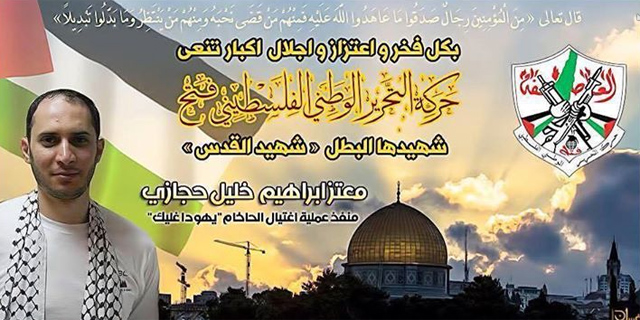 There were fierce clashes in East Jerusalem and fears of a new Palestinian uprising after Israeli police shot dead a 32-year-old Palestinian man suspected of having tried hours earlier to kill a far-right Jewish activist.
There were fierce clashes in East Jerusalem and fears of a new Palestinian uprising after Israeli police shot dead a 32-year-old Palestinian man suspected of having tried hours earlier to kill a far-right Jewish activist.
The Al-Aqsa compound, or Temple Mount, which is a central cause of the latest violence, was shut down to all visitors as a security precaution. It was the first full closure of the site, venerated by both Jews and Muslims, in 14 years.
Palestinian President Mahmoud Abbas denounced Israel’s actions as “tantamount to a declaration of war” and his Fatah party called for a “day of rage” today. It was not clear if Al Aqsa would be opened to Muslims on their holy day.
Moataz Hejazi’s body lay in blood among satellite dishes and a solar panel on the rooftop of a three-storey house in Abu Tor, a district of Arab East Jerusalem, as Israeli forces sealed off the area and repelled stone-throwing Palestinian protesters.
Hejazi was suspected of shooting and wounding Yehuda Glick, a far-right religious activist who has led a campaign for Jews to be allowed to pray at the Al-Aqsa compound.
Under rules that have governed Al-Aqsa since Israel seized the walled Old City in 1967, Jordan’s religious authorities are responsible for administering Al-Aqsa and while Jews may visit the marble-and-stone esplanade, which includes the 7th century golden Dome of the Rock, they cannot pray there.
Glick, a US-born settler, was shot as he left a conference at the Menachem Begin Heritage Centre in Jerusalem late on Wednesday. His assailant escaped on the back of a motorcycle. A spokesman for the centre said Hejazi had worked at a restaurant there. Glick, 48, remains in a serious but stable condition.
Israeli police spokesman Micky Rosenfeld said: “Anti-terrorist police units surrounded a house in the Abu Tor neighbourhood to arrest a suspect.
“Immediately upon arrival they were shot at. They returned fire and shot and killed the suspect.”
Locals identified the man as Hejazi, who was released from an Israeli prison in 2012 after serving 11 years. Israeli police fired stun grenades to keep back groups of angry residents, who shouted abuse as they watched from surrounding balconies.
One Abu Tor resident, an elderly Arab man with a walking stick who declined to be named, described Hejazi as a troublemaker and said “he should have been shot 10 years ago”. Others said he was a good son from a respectable family.
“They are good people, he does nothing wrong,” said Niveen, a young woman who declined to give her family name.
Hamas and Islamic Jihad, two militant groups, praised the shooting of Glick and mourned Hejazi’s death.
East Jerusalem, which Israel captured and occupied in the 1967 Middle East war, has been a source of intense friction in recent months, especially around Silwan, which sits in the shadow of the Old City and Al-Aqsa.
Jewish settler organisations have acquired more than two dozen buildings in Silwan over the years, including nine in the past three months, and moved settler families into them, an effort to make the district more Jewish. Around 500 settlers now live among approximately 40,000 Palestinians residents.
“It is not a good situation, it is the worst, everyone is angry,” said Galib Abu Nejmeh, 65, who wandered down the rock-strewn street dressed in a smart brown suit and tie. “It is becoming like another Intifada.”
Irish examiner

Leave a Reply
You must be logged in to post a comment.